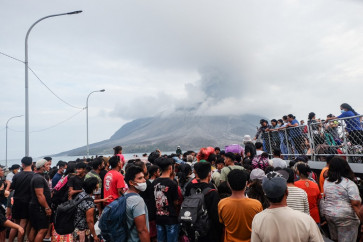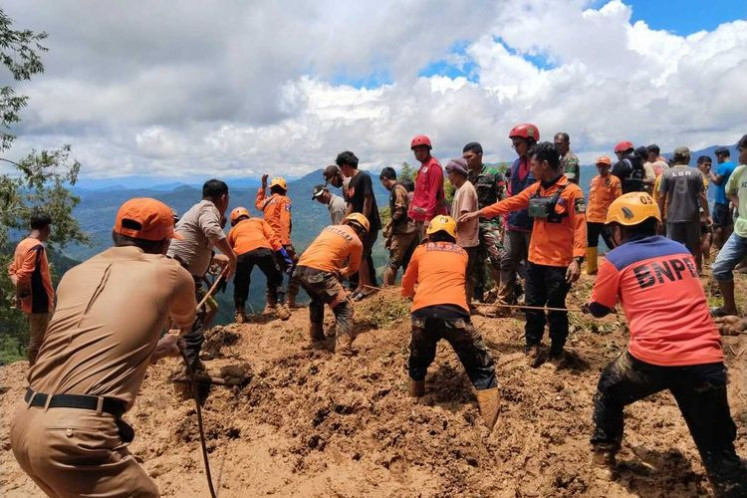Parties fight over support in Central Java
Paper shortage: An official from the Tegal General Elections Commission (KPUD) displays an example of a ballot paper to be used in the April 9 legislative election
Change Size
 Paper shortage: An official from the Tegal General Elections Commission (KPUD) displays an example of a ballot paper to be used in the April 9 legislative election. As of Wednesday, Tegal was running low on ballot papers for the election. (Antara/Oky Lukmansyah)" border="0" height="331" width="498">Paper shortage: An official from the Tegal General Elections Commission (KPUD) displays an example of a ballot paper to be used in the April 9 legislative election. As of Wednesday, Tegal was running low on ballot papers for the election. (Antara/Oky Lukmansyah)
Paper shortage: An official from the Tegal General Elections Commission (KPUD) displays an example of a ballot paper to be used in the April 9 legislative election. As of Wednesday, Tegal was running low on ballot papers for the election. (Antara/Oky Lukmansyah)" border="0" height="331" width="498">Paper shortage: An official from the Tegal General Elections Commission (KPUD) displays an example of a ballot paper to be used in the April 9 legislative election. As of Wednesday, Tegal was running low on ballot papers for the election. (Antara/Oky Lukmansyah)Central Java is largely expected to end up being an Indonesian Democratic Party of Struggle (PDI-P) stronghold in the 11th general election this year. Still, the party is not completely dominant in the countryâs third-largest province in terms of population. The Jakarta Postâs Central Java correspondent, Suherdjoko, offers a local view on the matter.
Ignoring the scorching heat, three young friends â Widi, Totok and Rahmat â were dancing passionately to the tune of a dangdut song performed by Reza Lawang Sewu during a PDI-P rally at Tri Lomba Juang Square in Semarang recently.
Wearing red shirts with the partyâs famous logo, a bull, the three friends, who will vote for the first time in the upcoming April 9 legislative election, showed their devotion to the party by staying in front of the campaign stage until PDI-P secretary-general Tjahjo Kumolo, the partyâs main campaigner, finally left the venue.
âLetâs be happy [â¦] the campaign period is the time when we can dance all day without worrying about hunger or thirst. My choice is none other than the bull,â Widi told the Post.
Data from the General Elections Commission (KPU) shows that there are 27.1 million registered voters for the April 9 legislative election in Central Java. Voters will cast their ballots at one of the provinceâs 77,693 polling stations.
In 2009, the PDI-P, the countryâs third-largest party overall, won the legislative election in Central Java after it secured 22.98 percent of the vote. The Democratic Party came in second with 15.74 percent, followed by the Golkar Party with 11.54 percent and the National Mandate Party (PAN) with 6.71 percent.
The PDI-Pâs campaign in Semarang, which was attended by thousands of party supporters, shows that the party has successfully maintained its grip in one of the countryâs most populated provinces.
âOver the past 10 years, the PDI-P has chosen to be an opposition party. This means it has been easy to manage consolidation with party members,â PDI-P Central Java chapter secretary Nuniek Sriyuningsih said.
Referring to the partyâs performance in Central Java in the past three elections, Nuniek said the PDI-P had decided it would not be overconfident.
In spite of being the provinceâs biggest party over the past 15 years, the PDI-P has seen its number of seats in the Central Java Legislative Council (DPRD) shrink from 39 out of 100 in 1999; to 31 in 2004; and 23 in 2009.
âLooking at the partyâs performance, we are upbeat we will secure up to 37 DPRD seats,â Nuniek said, adding that dozens of PDI-P politicians were now serving as regional or deputy regional heads in 22 of Central Javaâs
35 cities.
span class="inline inline-none">Paper shortage: An official from the Tegal General Elections Commission (KPUD) displays an example of a ballot paper to be used in the April 9 legislative election. As of Wednesday, Tegal was running low on ballot papers for the election. (Antara/Oky Lukmansyah) Central Java is largely expected to end up being an Indonesian Democratic Party of Struggle (PDI-P) stronghold in the 11th general election this year. Still, the party is not completely dominant in the country's third-largest province in terms of population. The Jakarta Post's Central Java correspondent, Suherdjoko, offers a local view on the matter.
P
Ignoring the scorching heat, three young friends ' Widi, Totok and Rahmat ' were dancing passionately to the tune of a dangdut song performed by Reza Lawang Sewu during a PDI-P rally at Tri Lomba Juang Square in Semarang recently.
Wearing red shirts with the party's famous logo, a bull, the three friends, who will vote for the first time in the upcoming April 9 legislative election, showed their devotion to the party by staying in front of the campaign stage until PDI-P secretary-general Tjahjo Kumolo, the party's main campaigner, finally left the venue.
'Let's be happy ['¦] the campaign period is the time when we can dance all day without worrying about hunger or thirst. My choice is none other than the bull,' Widi told the Post.
Data from the General Elections Commission (KPU) shows that there are 27.1 million registered voters for the April 9 legislative election in Central Java. Voters will cast their ballots at one of the province's 77,693 polling stations.
In 2009, the PDI-P, the country's third-largest party overall, won the legislative election in Central Java after it secured 22.98 percent of the vote. The Democratic Party came in second with 15.74 percent, followed by the Golkar Party with 11.54 percent and the National Mandate Party (PAN) with 6.71 percent.
The PDI-P's campaign in Semarang, which was attended by thousands of party supporters, shows that the party has successfully maintained its grip in one of the country's most populated provinces.
'Over the past 10 years, the PDI-P has chosen to be an opposition party. This means it has been easy to manage consolidation with party members,' PDI-P Central Java chapter secretary Nuniek Sriyuningsih said.
Referring to the party's performance in Central Java in the past three elections, Nuniek said the PDI-P had decided it would not be overconfident.
In spite of being the province's biggest party over the past 15 years, the PDI-P has seen its number of seats in the Central Java Legislative Council (DPRD) shrink from 39 out of 100 in 1999; to 31 in 2004; and 23 in 2009.
'Looking at the party's performance, we are upbeat we will secure up to 37 DPRD seats,' Nuniek said, adding that dozens of PDI-P politicians were now serving as regional or deputy regional heads in 22 of Central Java's
35 cities. 
Last year, the PDI-P managed to help former lawmaker Ganjar Pranowo win his Central Java gubernatorial bid. PDI-P presidential candidate Joko 'Jokowi' Widodo was Surakarta mayor before he was elected Jakarta governor
in 2012.
Being considered as the PDI-P's strongest contender in Central Java, the Dems, the country's largest party, however, has chosen to revise down its election target, mainly due to the party's shrinking popularity following the involvement of its politicians in several graft cases in past years.
Agus Hermanto, who leads the Democratic Party's election campaign team in Central Java, said the party had managed to secure 16 DPRD seats in the 2009 legislative election but it was eyeing fewer that this year.
'To be realistic, many surveys have predicted public support for the party will drop by up to 5 percent in the upcoming election,' Agus told reporters.
Meanwhile, Golkar, the country's second-largest party, has set the more optimistic target of 20 DPRD seats, according to Golkar's Central Java chapter secretary Iqbal Wibisono.
During a recent Golkar rally in Semarang, senior politician Akbar Tandjung shared his confidence about the target.
'Golkar used to only have six regional heads and deputy regional heads in Central Java, but now we have 15,' Akbar said.
Smaller parties, like the Hanura Party, the Gerindra Party and the newly established Nasdem Party, have also been upbeat about their chances of grabbing a slice of the action in Central Java.
Hanura's Central Java chapter head Djoko Besariman said the party was targeting 14 DPRD seats in Central Java, while Gerindra's Abdul Wahid said he was upbeat that his party would finish in the top three in the legislative
election.
Unlike the nationalist parties' aggressive Central Java-centric campaigns, Muslim-based parties, like the Prosperous Justice Party (PKS), the National Awakening Party (PKB) and the United Development Party (PPP), have chosen to keep a low profile ahead of the upcoming election.
Instead of running an open rally, the PPP, for example, has chosen to run small gatherings attended by the party's legislative candidates and no more than 200 supporters. Meanwhile, PKS candidates have directly approached potential voters by, for example, distributing comic books to the province's young voters.
Despite their 'silent' campaign, the PKS, the PKB and the PPP are each targeting to clinch a dozen DPRD seats in Central Java the upcoming election.
Political parties, however, must not be overconfident with their performance as there are many Central Java voters who are still undecided what way they will swing on polling day.
East Semarang resident Wijanarko, for example, has strongly criticized political parties for failing to make a significant change in the past years.
'Honestly, I still don't know what party to choose after I learned that no legislative candidate made a significant contribution to society,' he said.
Your Opinion Matters
Share your experiences, suggestions, and any issues you've encountered on The Jakarta Post. We're here to listen.
Thank You
Thank you for sharing your thoughts. We appreciate your feedback.









